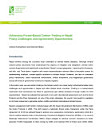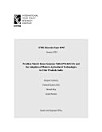Integrating agriculture policies with climate change strategies and commitments in Nepal
Chaudhary, Arbind · Babu, Suresh Chandra · Srivastava, Nandita
Jul 2025 · Intl Food Policy Res Inst
Ebook
11
Pages
family_home
Eligible
info
reportRatings and reviews aren’t verified Learn More
About this ebook
The world continues to grapple with acute hunger, malnutrition, poverty, income inequality, and other crises. In 2023, approximately 864 million people experienced severe food insecurity (FAO et al. 2024). On the one hand, poor policy adoption disrupts market and supply chain vulnerabilities, exacerbates food insecurity, and causes economic instability and crises (Hélène and Cohen 2020). On the other hand, disasters and extreme weather conditions significantly damage available infrastructure, transportation networks, and storage facilities, disrupting the distribution of agricultural commodities and as well as regular food patterns (Hasegawa et al. 2021). The COP28 UAE Declaration on Sustainable Agriculture, Resilient Food Systems, and Climate Action recognizes that agriculture and food systems must urgently adapt and transform to meet the challenges of climate change. It commits to integrating agriculture and food systems into climate action while simultaneously mainstreaming climate action across policy agendas and actions related to agriculture and food systems (UNFCCC 2023).
Rate this ebook
Tell us what you think.
Reading information
Smartphones and tablets
Install the Google Play Books app for Android and iPad/iPhone. It syncs automatically with your account and allows you to read online or offline wherever you are.
Laptops and computers
You can listen to audiobooks purchased on Google Play using your computer's web browser.
eReaders and other devices
To read on e-ink devices like Kobo eReaders, you'll need to download a file and transfer it to your device. Follow the detailed Help Center instructions to transfer the files to supported eReaders.








